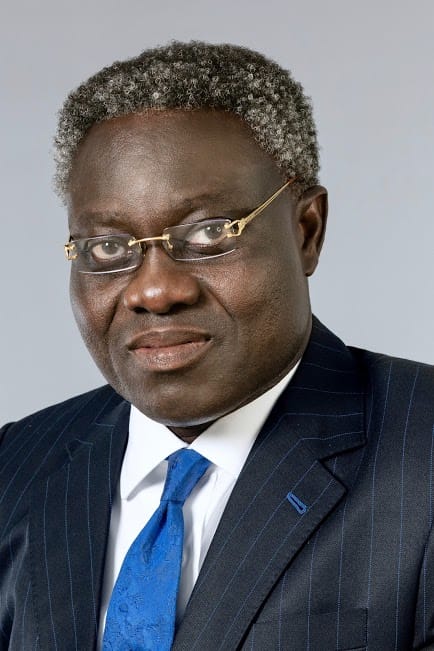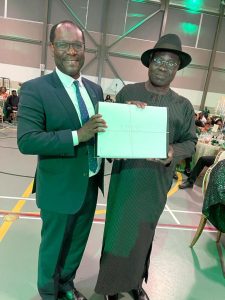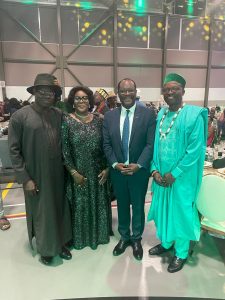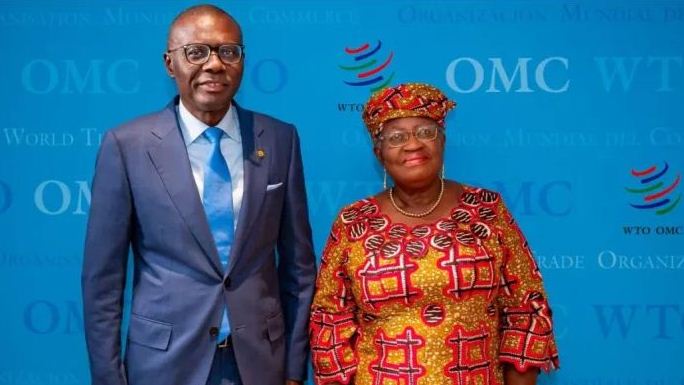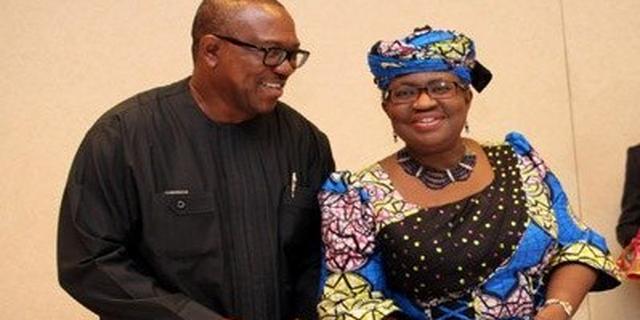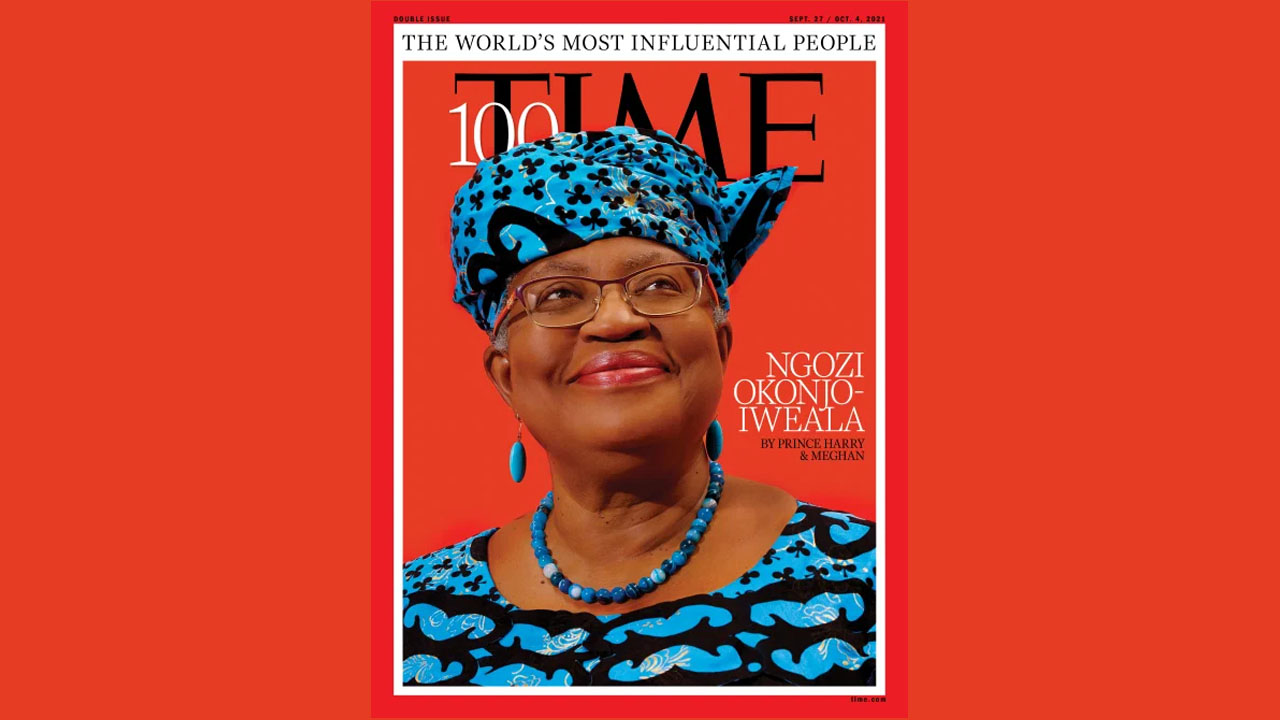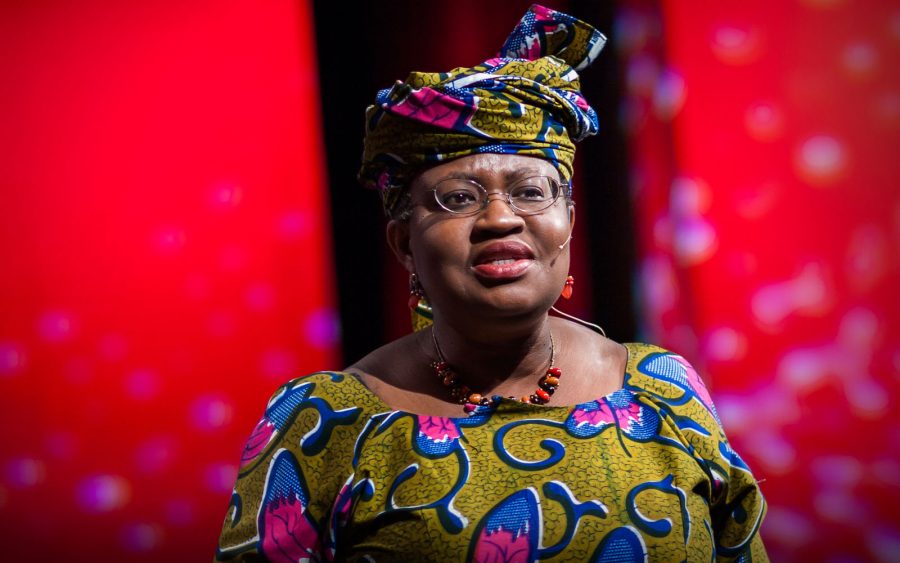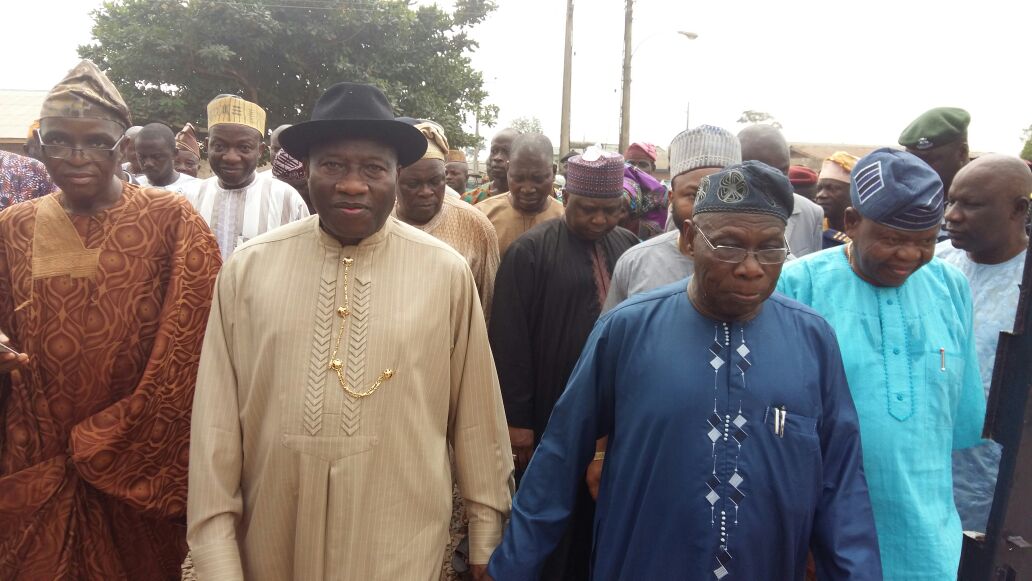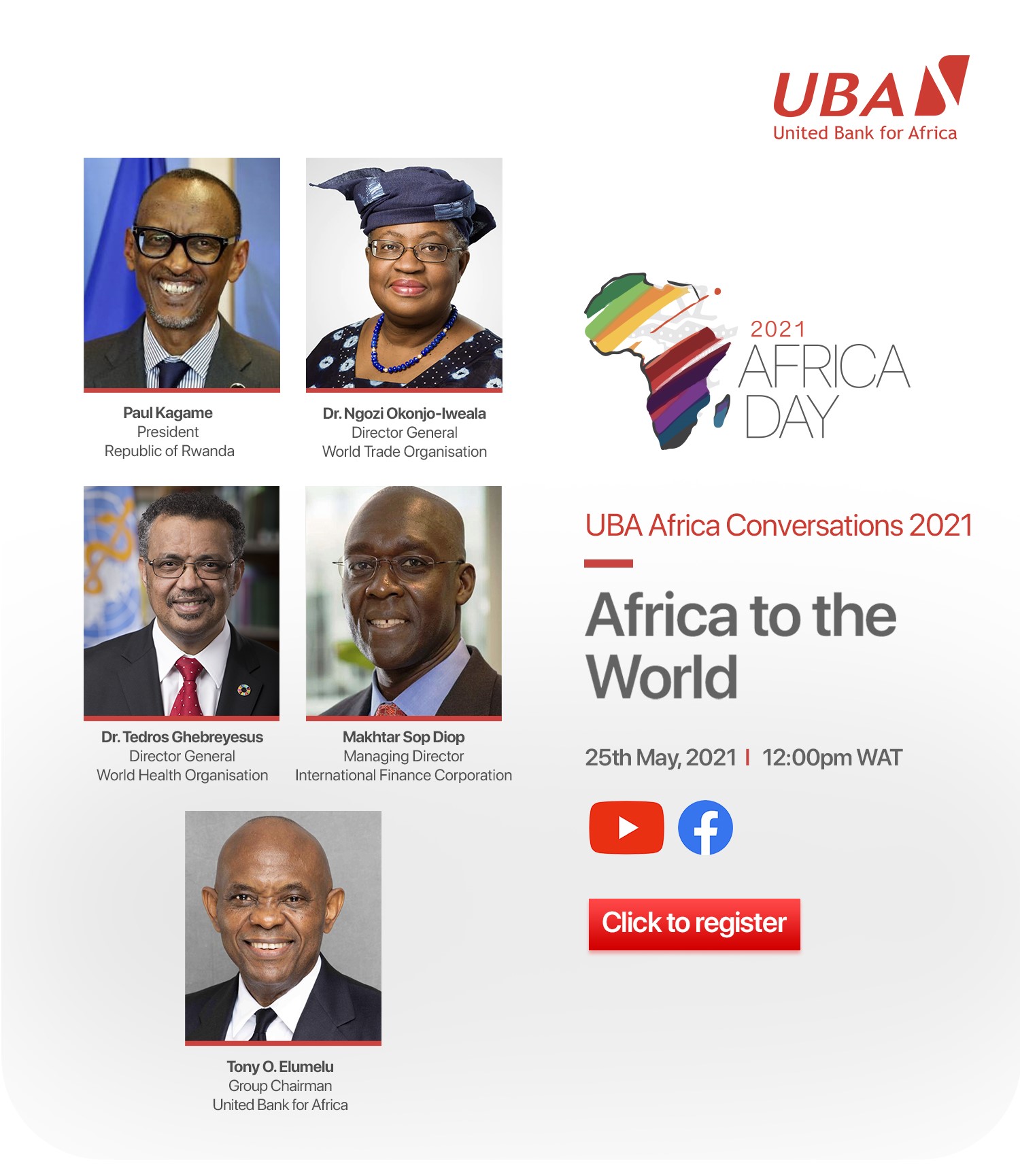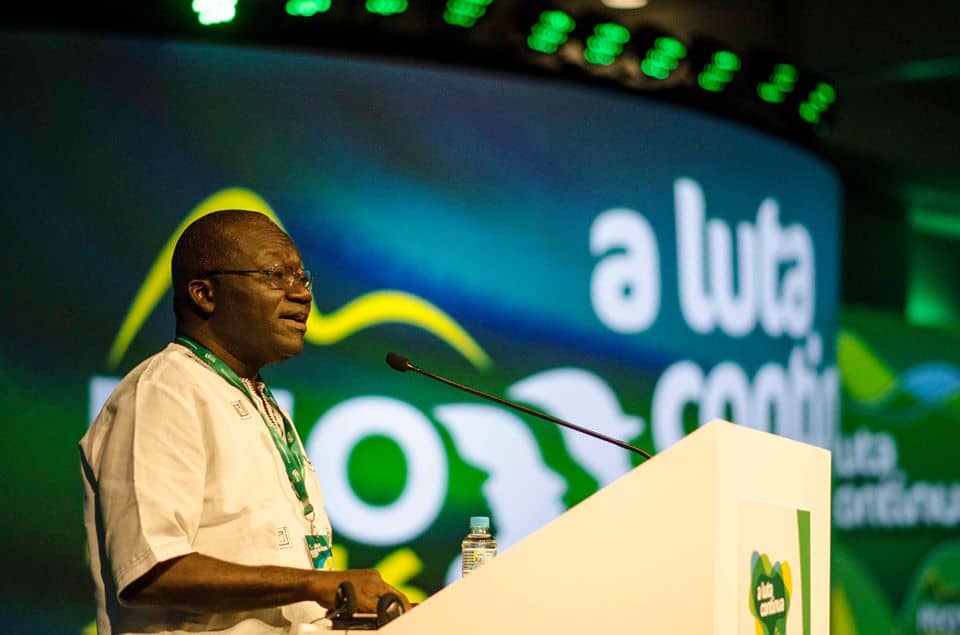Governor Babajide Sanwo-Olu of Lagos State has made a stopover at the WTO headquarters, Geneva area of Switzerland, to greet the Director-General of World Trade Organisation, WTO, Dr. Ngozi Okonjo-Iweala.
Dr. Okonjo-Iweala, a former minister of finance in Nigeria, took office as WTO director-general on March 1, 2021.
Sanwo-Olu paid the visit, Tuesday, while in Geneva for the International Federation of Consulting Engineers (FIDIC) global infrastructure conference.
The conference is themed: “Mega-City – Government Perspective on Delivering Sustainable Solutions/Global Perspective Going Beyond Net Zero.”
Among those present at the conference were the chief executive officer of FIDIC, Nelson Ogunshakin, and president of FIDIC, Anthony Barry.
TheNewsGuru.com reports that Sanwo-Olu was on Monday evening presented the FIDIC president’s award for exceptional leadership and contribution to infrastructure development in Lagos.
Barry presented the award to the governor at the FIDIC global infrastructure awards ceremony.
Among those who made up Sanwo-Olu’s entourage to Geneva were his special adviser on works and infrastructure, Aramide Adeyoye; commissioner for economic planning and budget, Sam Egube; managing director, Lagos Metropolitan Area Transport Authority (LAMATA), Abimbola Akinajo; and commissioner for transportation, Federic Oladeinde.
Dr. Okonjo-Iweala took office as WTO Director-General on 1 March 2021.
She is the seventh Director-General of the WTO.
The WTO DG is the first woman and the first African to serve as Director-General.
Her term of office will expire on 31 August 2025.
WHAT YOU NEED TO KNOW ABOUT OKONJO-IWEALA
Dr Ngozi Okonjo-Iweala took office as WTO Director-General on 1 March 2021. She is a global finance expert, an economist and international development professional with over 30 years of experience working in Asia, Africa, Europe, Latin America and North America.
Dr Okonjo-Iweala was formerly Chair of the Board of Gavi, the Vaccine Alliance. She was previously on the Boards of Standard Chartered PLC and Twitter Inc. She was appointed as African Union (AU) Special Envoy to mobilise international financial support for the fight against COVID-19 and WHO Special Envoy for Access to COVID-19 Tools Accelerator.
She is a skilled negotiator and has brokered numerous agreements which have produced win-win outcomes in negotiations. She is regarded as an effective consensus builder and an honest broker enjoying the trust and confidence of governments and other stakeholders.
Dr. Okonjo-Iweala twice served as Nigeria’s Finance Minister (2003-2006 and 2011-2015) and briefly acted as Foreign Minister in 2006, the first woman to hold both positions. She distinguished herself by carrying out major reforms which improved the effectiveness of these two Ministries and the functioning of the government machinery.
She had a 25-year career at the World Bank as a development economist, rising to the No. 2 position of Managing Director, Operations. As a development economist and Finance Minister, Dr Okonjo-Iweala steered her country through various reforms ranging from macroeconomic to trade, financial and real sector issues.
She is a firm believer in the power of trade to lift developing countries out of poverty and assist them to achieve robust economic growth and sustainable development.
As Finance Minister, she was involved in trade negotiations with other West African countries and contributed to the overhaul of Nigeria’s trade policy enabling it to enhance its competitiveness.
She is renowned as the first female and African candidate to contest for the presidency of the World Bank Group in 2012, backed by Africa and major developing countries in the first truly contestable race for the world’s highest development finance post.
As Managing Director of the World Bank, she had oversight responsibility for the World Bank’s $81 billion operational portfolio in Africa, South Asia, Europe and Central Asia. Dr Okonjo-Iweala spearheaded several World Bank initiatives to assist low-income countries during the 2008-2009 food crisis and later during the financial crisis.
In 2010, she was Chair of the World Bank’s successful drive to raise $49.3 billion in grants and low interest credit for the poorest countries in the world.
As Minister of Finance in Nigeria, she spearheaded negotiations with the Paris Club of Creditors that led to the wiping out of $30 billion of Nigeria’s debt, including the outright cancellation of $18 billion.
In her second term as Finance Minister, Dr Okonjo-Iweala was responsible for leading reform that enhanced transparency of government accounts and strengthened institutions against corruption, including the implementation of the GIFMS (Government Integrated Financial Management System), the IPPMS (Integrated Personnel and Payroll Management System), and the TSA (Treasury Single Accounts).
Dr Okonjo-Iweala has been listed as one of the world’s most influential leaders (Time, 2021), one of the 25 most influential women (Financial Times, 2021), Minister of the Decade, People’s Choice Award by Nigeria’s This Day newspaper (2020), one of Transparency International’s Eight Female Anti-Corruption Fighters Who Inspire (2019), one of the 50 Greatest World Leaders (Fortune, 2015), the Top 100 Most Influential People in the World (TIME, 2014), the Top 100 Global Thinkers (Foreign Policy, 2011 and 2012), the Top 100 Most Powerful Women in the World (Forbes, 2011, 2012, 2013 and 2014), the Top Three Most Powerful Women in Africa (Forbes, 2012), the Top 10 Most Influential Women in Africa (Forbes, 2011), the Top 100 Women in the World (The UK Guardian, 2011), the Top 150 Women in the World (Newsweek, 2011), and the Top 100 most inspiring people in the World Delivering for Girls and Women (Women Deliver, 2011). She has also been listed among 73 “brilliant” business influencers in the world by Condé Nast International.
In 2021, she received a Global Leadership Award from the United Nations Foundation as a “Champion for Global Change”. In 2020, she became an Angelopoulos Global Public Leader at Harvard University Kennedy School. She was also appointed to the Presidential Economic Advisory Council (PEAC) for President of South Africa His Excellency Cyril Ramaphosa.
In 2019, Dr Okonjo-Iweala was elected to the American Academy of Arts and Sciences. In 2017, she received the Madeleine K. Albright Global Development Award from the Aspen Institute, the Women’s Economic Empowerment Award from WEConnect International, and the Vanguard Award from Howard University.
In 2016, she received the Power with Purpose Award from the Devex Development Communications Network and the Global Fairness Award from the Global Fairness Initiative in recognition of her contribution to sustainable development. She was also conferred High National Honours from the Republic of Cote d’Ivoire and the Republic of Liberia. She is also the recipient of Nigeria’s third highest National Honors Commander of the Federal Republic (CFR).
In addition, Dr Okonjo-Iweala has been awarded the David Rockefeller Bridging Leadership Award (2014), the President of the Italian Republic Gold Medal by the Pia Manzu Centre (2011), the Global Leadership Award by the Chicago Council on Global Affairs (2011) the Global Leadership Award by the Columbia University School of International and Public Affairs (2010), and the Bishop John T. Walker Distinguished Humanitarian Service Award (2010). She was named Finance Minister of the Year (Africa Investor Magazine, 2014), Finance Minister of the Year for Africa and the Middle East (THE BANKER, 2004), Global Finance Minister of the Year (EUROMONEY, 2005), Finance Minister of the Year for Africa and the Middle East (Emerging Markets Magazine, 2005), and Minister of the Year (THISDAY, Newspaper 2004 and 2005).
Dr Okonjo-Iweala is currently also Chair of the Board of the African Union’s African Risk Capacity (ARC), an innovative weather-based insurance mechanism for African countries; and co-Chair of the Global Commission on the Economy and Climate with Lord Nicholas Stern and Mr Paul Polman.
She is also Chair of the Board of the Nelson Mandela Institution, an umbrella body for the African Institutes of Science and Technology, and Chair of the Board of the African University of Science and Technology, Abuja. Dr Okonjo-Iweala is a trustee of the Carnegie Endowment for International Peace.
She presently serves on the following advisory boards or groups — the Asian Infrastructure Investment Bank, Harvard University International Advisory Board, the Oxford University Martin School Advisory Council, Mercy Corps International Advisory Board, Women’s World Banking Africa Advisory Board, the International Commission on Financing Global Education (Chaired by Gordon Brown), Japan International Cooperation Agency (JICA) Advisory Board, Tsinghua University Beijing — School of Public Policy and Management Global Advisory Board, the CARICOM (Caribbean) Commission on the Economy, the Bloomberg Task Force on Fiscal Policy for Health, and Tax Inspectors Without Borders of the OECD among others.
She is a member of the B Team of Business and Civic Leaders cofounded by Sir Richard Branson, a board member of the Ellen Johnson Sirleaf Foundation, and also co-chair and board member of Lumos, an Africa focused renewable energy company.
She was also a Senior Adviser at Lazard (2015-2019) and she served as the co-Chair of the Global Partnership for Effective Development Cooperation with UK Secretary Justine Greening, and Chair of the World Bank’s Development Committee (2004).
She was also a member of the International Monetary and Finance Committee of the IMF (2003-2006 and 2011-2015), the United Nations’ Secretary General’s High-Level Panel on the Post-2015 Development Agenda, the Danish Government-led Commission on Africa, the World Economic Forum Global Leadership Council on Transparency and Corruption, and the Commission on World Growth (led by Nobel Prize winner Professor Michael Spence). She served for a decade on the Rockefeller Foundation Board and the World Economic Forum Young Global Leaders.
Dr Okonjo-Iweala has also served on the advisory board of the ONE Campaign, the Clinton Global Initiative, the Global Development Network, and the University of Oxford’s Blavatnik School of Government.
Dr Okonjo-Iweala is the founder of Nigeria’s first ever indigenous opinion-research organization, NOI-Polls. She also founded the Center for the Study of Economies of Africa (C-SEA), a development research think tank based in Abuja, Nigeria. She is a Distinguished Visiting Fellow at the Center for Global Development, and also at the Brookings Institution, premier Washington D.C. think tanks.
Dr Okonjo-Iweala graduated magna cum laude with an A.B. in Economics from Harvard University (1976) and earned a Ph.D. in Regional Economics and Development from the Massachusetts Institute of Technology (MIT, 1981).
She has received honorary degrees from 15 universities worldwide, including from: Yale University, the University of Pennsylvania, Brown University, Trinity College (University of Dublin), Amherst College, Colby College, Tel Aviv University, and Northern Caribbean University, Jamaica. She also has honorary doctorate degrees from the University of Amsterdam and a host of Nigerian universities including Abia State University, Delta State University, Oduduwa University, Babcock University, and the Universities of Port Harcourt, Calabar, and Ife (Obafemi Awolowo).
She is the author of numerous articles and several books, including Women and Leadership: Real Lives, Real Lessons co-authored with Julia Gillard (Penguin Random House, July 2020), Finding A Vaccine is Only the First Step (Foreign Affairs, April 2020), Fighting Corruption is Dangerous: The Story Behind the Headlines (MIT Press, 2018), Reforming the UnReformable: Lessons from Nigeria, (MIT Press, 2012), Mobilizing Finance for Education in the Commonwealth (Commonwealth Education Report 2019), Shine a Light on the Gaps — an essay on financial inclusion for African Small Holder Farmers (Foreign Affairs, 2015), Funding the SDGs: Licit and Illicit Financial Flows from Developing Countries (Horizons Magazine, 2016), and The Debt Trap in Nigeria: Towards a Sustainable Debt Strategy (Africa World Press, 2003). She also co-authored with Tijan Sallah the book Chinua Achebe: Teacher of Light (Africa World Press, 2003).
Dr. Okonjo-Iweala is married to neurosurgeon Dr. Ikemba Iweala. They have four children and three grandchildren.


